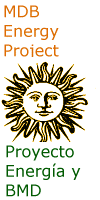
Energy Project
The global energy economy is facing a crisis in terms of lack of capital, social inequity and environmental degradation. New and renewable energy technologies, coupled with major improvements in the efficiency of energy services, are increasingly able to form part of a solution to this crisis.
The World Bank, and other Multilateral Development Banks (MDBs), are the main source of public funds for energy investments. As "lenders of last resort", and as banks for "reconstruction and development", the MDBs are mandated to accept larger risks than commercial banks. This means that the MDBs are in a position to lead the way in the transition to sustainable energy supply and use by taking on board the financial risks associated with opening markets for new and renewable energy technologies.
The MDBs have a history of concentrating on large-scale, capital intensive energy expansion projects in their lending operations. Increasingly, they are also recognizing the need to promote sustainable energy, and are taking various initiatives to do this. However, it is apparent that these initiatives are barely influencing current MDB energy operations, which are still strongly biased towards supply-oriented and fossil-fuel based investments. Moreover, there is no significant trend in the MDBs’ project pipelines to indicate that reforms are taking hold.
Overview and Aims
The MDB-Energy Project was initiated in June, 1996 by a group of 21 non-governmental organizations (NGOs) from Latin America, Africa, Asia and Central & Eastern Europe. The overall goal of the project is to make a long term contribution to efforts that reorient the energy sector investments of the MDBs towards sustainable energy.
The MDB-Energy Project aims to:
- Enhance the capacity within existing NGO "MDB networks" to promote sustainable energy lending.
- Undertake independent monitoring and evaluation of MDB energy policies and operations by gathering information, conducting research, and preparing case-studies.
- Systematically pool information, knowledge and resources in an international, concerted, and focused attempt to reform the MDBs energy sector activities.
- Undertake national, regional, and international level advocacy work relating to the energy sector investments of the MDBs.
- Reach out to and strengthen informal national networks of NGOs working on energy and MDB issues.
- Collaborate with existing international NGO networks working on issues relating to sustainable energy, climate change, and Multilateral Development Banks.
- Maintain a constructive dialogue between NGOs, parliamentarians, academics, MDB officials, and private firms in relation to the MDBs energy sector activities.
- Focus increased media attention on MDB energy operations and sustainable energy alternatives.
The MDB Energy Project: Partner Organizations
Under the MDB Energy Project, 21 NGOs have joined together in an informal, international network to support independent monitoring and evaluation of MDB energy policies and operations across the globe.
Regional Coordinating Organizations and National Focal Points in Africa, Asia, Central & Eastern Europe, and Latin America are served by an International Secretariat, based in the Netherlands.
Organizations participating in the project include:
- Centro de Estudos de Energia e Meio Ambiente - Brasil
- Centre for Environmental Information and Education - Bulgaria
- Global Village Cameroon - Cameroon
- Asociacion Centro Nacional Salud, Ambiente y Trabajo (CENSAT) - Colombia
- Program Energetickych Uspor - Czech Republic
- Energia Klub - Hungary
- PRAYAS - India
- Pelangi -Indonesia
- Econews - Kenya
- Resource Projects - Kenya
- Lithuanian Green Movement - Lithuania;
- Equipo Pueblo - México
- Both ENDS- Netherlands
- Legal Rights and Natural Resources Center - Philippines
- CEE Bankwatch Network - Poland
- ENDA-tm - Senegal
- National Ecological Centre - Ukraine
- Instituto del Tercer Mundo - Uruguay
- Centro de Estudios Uruguayos sobre Tecnologías Apropiadas (CEUTA) - Uruguay;
- Zero - Zimbabwe.
For more information, please contact:
AFRICA
Regional Coordinator, MDB-Energy Project
Econews Africa
P.O.Box 76406
Nairobi, Kenya
Tel: +254 2 604682/605127
Fax: +254 2 604682
Email: econews@tt.gn.apc.org
ASIA
Regional Coordinator, MDB-Energy Project Legal Rights and Natural Resources Center, Inc.
3/F Puno Bldg. # 47, Kalayaan Ave.,
Diliman, Quezon City, The Philippines
Tel: +632 927 9670/ 928 1372
Fax: +632 920 7172
Email: lrcksk@mnl.sequel.net
CENTRAL & EASTERN EUROPE (CEE)
Regional Coordinator, MDB-Energy Project
Energy Efficiency Program, c/o Biocit
Chlumova 17
130 00 Praha 3 - Zizkov - Czech Republic
Tel/Fax: +420 2 22 78 00 52
Email: peu@ecn.cz
LATIN AMERICA & CARRIBEAN
Regional Coordinator, MDB-Energy Project
Instituto del Tercer Mundo
Jackson 1136
11200 Montevideo - Uruguay
Tel. +598 2 496192
Fax. +598 2 419222
Email: energia@chasque.apc.org
NTERNATIONAL SECRETARIAT
Both Ends
Damrak 28-30
1012 LJ Amsterdam - the Netherlands
Tel: +31 20 623 0823
Fax: +31 20 620 8049
Email: bothends@bothends.antenna.nl
[ home ] [ about ] [ contents ]
[ other sites ] [ ITeM
]
Copyright © 1997 Instituto del Tercer Mundo
The Multilateral Development Banks Energy Project
energia@chasque.apc.org